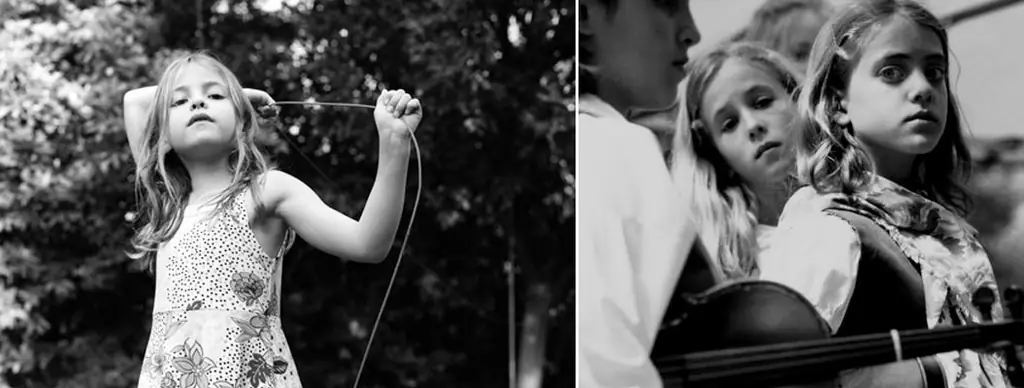- Author Adrian Jeff jeff@psychologosportal.com.
- Public 2023-12-17 05:06.
- Last modified 2025-01-24 14:09.

The smartest kid in the class. How to raise a child smarter than their parents?
The teachers are praised, but the student is not delighted, the tutors are satisfied, and the student is more and more immersed in himself, the parents are immensely proud and rejoice at success, and the child is more and more passive and withdrawn. More and more often alone, in his room, with the curtains drawn and tasks completed for the week ahead … so that there is no reason to touch him. In headphones, in a computer, in silence …
The exams are excellent, the best student in the class, the tutors are delighted, the academic performance is off scale, but there is zero enthusiasm.
The child completes all school and extracurricular tasks with amazing ease, without straining at all, practically without making any effort. Almost instantly he loses interest in classes and studies, does everything quickly, only to be left behind, left alone, alone with a computer or tablet.
There is no subject at school that would arouse interest in a child. Additional classes, circles, sections and tutors are still easy, but they do not become hobbies. Dancing, music, sports, painting, languages - everything fades very quickly and does not cause much desire to continue studying.
The teachers are praised, but the student is not delighted, the tutors are satisfied, and the student is more and more immersed in himself, the parents are immensely proud and rejoice at success, and the child is more and more passive and withdrawn. More and more often alone, in his room, with the curtains drawn and tasks completed for the week ahead … so that there was no reason to touch him. In headphones, in a computer, in silence.
I'm the smartest, so what?.
When everyone around you repeats how smart, talented and ingenious you are, you yourself involuntarily begin to believe in it. If you solve a test in 20 minutes, answer an exam without preparation, and still succeed in music and art schools and are part of the school swimming and tennis team, the thought creeps in that you are some kind of special, that you are the best at everything, and if not a genius, then certainly a gifted person.
What is given to others with great difficulty is easy for you. Your classmates barely make it to the end of the quarter without Cs, and you do your homework during recess.
Over time, any success does not bring the former feeling of joy or even satisfaction. Everything that is given without effort has no special value, and then completely loses its meaning. Almost everything is forgiven for your success, but more and more often any purchases, gifts and entertainment bring less pleasure and get bored very quickly. The more you have, the less you want it.
A strange all-encompassing disappointment sets in, life fades and loses its meaning. The thought is spinning in my head that I can have whatever I want, but why? Who can understand me? Those who cannot solve an elementary problem in physics? All their conversations with me come down to either "let me write it off" or "how do you do it all."
Gradually, all the incentives disappear, you don't want to do anything but wander endlessly in the virtual world in search of a way out, answers, reasons. There, no one envies you, admires you, is not amazed and does not wonder how you do it. You can be yourself there.
How not to miss a problem for parental pride
At first glance, the child does well, learns well, easily and quickly completes all tasks, everyone praises - what's the problem? All that remains is to rejoice. Or not?
It all depends on the innate psychological properties of the child. Yuri Burlan's system-vector psychology explains which children can easily learn but quickly lose interest in school, why this is so, and what to do with such a child.

High potential, abstract intelligence, the ability to deeply concentrate - all this gives a child with a sound vector the opportunity to learn faster than others, but the same properties, if wrongly brought up, can play a cruel joke with a little sound engineer. Great academic success, universal approval, turning into admiration, easy victories - all this against the background of innate introversion forms in the child the belief that he is the smartest, egocentrism is cultivated, confidence in his own genius, there is a distance from society. As a result, the significance of efforts is lost, the value of success, the joy of the work done, and disappointment grows.
The entire period of childhood until the end of puberty is the process of development of the innate psychological properties of each person. Subsequently, throughout life, the existing properties are realized at the level to which they managed to develop. It is on this that the volume of pleasure from life that will be felt by a person depends. This is the very joy, fulfillment, meaningfulness and pleasure from what you do every day, what we call happiness.
The highest level of personality development is the ability for fruitful and creative activities for the benefit of society. Realization of oneself in work directed at others, away from oneself, towards bestowal, outward, outward. Only in this way does the filling of the properties of any vectors take place and is felt as pleasure. Anything that is directed inward, for oneself, towards consumption, is a primitive, a low-level realization, which can be considered more likely to relieve tension than to receive satisfaction or joy.
At present, each new generation is born with a knowingly greater temperament in comparison with the previous one, the difference in mental potential between children and parents is enormous and continues to increase. Along with the increasing capabilities of our children, the potential suffering from gaping voids in the psyche grows in the event that desires are not fulfilled.
The high psychological literacy provided by the system-vector psychology of Yuri Burlan is today becoming that instrument of mutual understanding between the child and the parent, which makes it possible to harmoniously develop a growing personality. It is about such changes in upbringing that the participants of the training talk about in their interviews on the reviews page //www.yburlan.ru/results/all/otnoshenija-s-detmi
Changing the focus of education
While enjoying easy success in your child's studies, you can easily miss that moment of loss of motivation for learning, interest in knowledge and enthusiasm in any activity, after which there is a stop in development. The movement towards egocentrism, the cultivation of imaginary genius, elevation above others is a path to nowhere, which is fraught only with disappointment in studies, loss of meaning in life, further immersion in oneself and distance from society.
And on the contrary, systemic education, taking into account the peculiarities of the psyche of a small sound engineer, implies an obligatory atmosphere of silence, the opportunity for solitude and the availability of free time, the absence of traumatic factors for the sound engineer - noise, loud music, shouting or insults addressed to him. A well-chosen home library should stimulate abstract thinking and productive sound search, for example, it can be biographies of realized sound artists and their works, children's encyclopedias, science fiction or classical poetry.

In the upbringing of a sound intellectual, the main thing is to emphasize the importance of focusing outward, productive work of the mind, focus on creating, giving birth to thought forms. A constant internal dialogue, an endless chain of thoughts should not remain constantly inside. Teaching the sound engineer to clothe his thoughts in words, verbalize his ideas and at least partially embody them in reality becomes the driving force for the development of the child in the direction of creation. And the knowledge gained in the learning process can become a means for realizing a sound search, but in no way a way to buy off annoying parents in order to go into the virtual world of illusions. A sound engineer will never study for the sake of study, but for the sake of acquiring the necessary knowledge, for the sake of satisfying shortcomings, for the sake of finding answers to an inner question and understanding the essence of what is happening.
All moments of pleasure, at least partially filling the sound, should be associated with interaction with other people. The task of the parents of a little sound engineer is to set the direction of implementation in society, and not in their own heads. Very good results are obtained from the adapted, initial information about vectors, about the system-vector psychology of Yuri Burlan. The vector characteristics are captured by the little sonicator on the go, helping him to be interested in others, thus going outside.
The modern child carries the potential of tremendous power. This means that the enjoyment of filling the needs of the sound can be simply amazing even for himself. Having felt the filling of such power several times, the sound engineer himself will strive for such activities, he will independently seek opportunities for his own realization, using his impressive intellect for the good of society.
You can learn all the secrets of upbringing modern children “out of this world” at the training on system-vector psychology by Yuri Burlan.
Register for the nearest free online lecture course now. Don't miss the fun!






